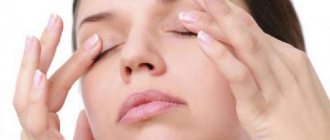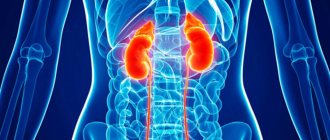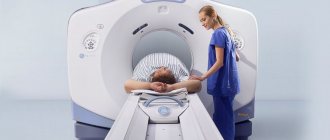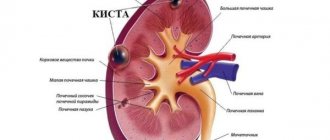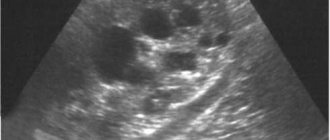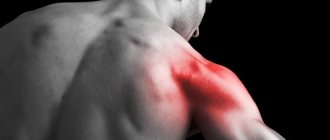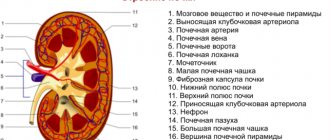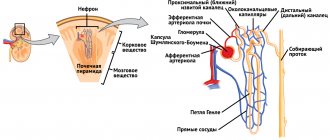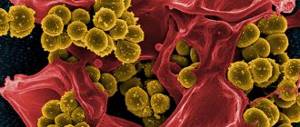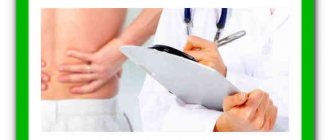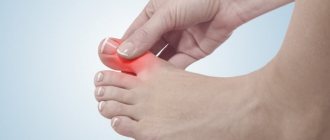The occurrence of sharp or nagging pain in the upper lumbar back is one of the characteristic symptoms of ailments affecting the kidneys.
The reasons for their appearance may be different and, accordingly, the treatment aimed at eliminating them will also be different.
Knowledge of the primary symptoms and reasons why the kidneys hurt will allow you to pay attention to the appearance of discomfort in time and prevent the development of complications.
Functions, pathologies, type of pain
Representing a paired organ, the kidneys are located on both sides of the spine at the level of the 11th thoracic and 3rd lumbar vertebrae. They are bean-shaped, dimensions 10-12×5-6×3 cm and weight 120-300 g. Due to the fact that another organ, the liver, is located above the right kidney, it is lowered slightly below the left.
Kidney location
The main function of these organs is to filter the blood and excrete the resulting metabolic products in the urine. Kidney diseases are a series of pathological processes that affect the tissues of this organ - inflammation, functional disorders, neoplasms.
Kidney pain or nephralgia that occurs in this case can be constant or paroxysmal in nature, be acute, pressing or aching. Nephralgia is quite common and occurs in 3-4% of the population, more often in women than in men.
Manifestations of nephralgia are similar to pain caused by:
- an attack of appendicitis;
- colic occurring in the bile ducts;
- dysfunction of the gastrointestinal tract;
- manifestation of osteochondrosis or disc herniation;
- ailments of the liver or spleen;
- prostatitis.
Kidney pain is often accompanied by a temperature jump, the appearance of symptoms of chills, nausea and vomiting.
Increasing pain can occur in the side and lower abdomen, and can also be localized in the back.
Characterized by high sensitivity to touch and frequent urge to urinate.
Treatment
Treatment at home is acceptable if there is no need for hospital treatment after the patient has been examined and the doctor has determined the diagnosis.
Then the patient receives the necessary list of prescriptions and knows what to treat, what to take and what to drink in his particular case.
But sometimes an attack of pain takes a person unexpectedly, and you need to know what to do as first aid.
Emergency measures
- The first necessary action in case of sudden sharp pain in the kidneys is to call an ambulance . This should be done by those who have not previously had any experience of contacting doctors on this issue, and by those who are experiencing pain not for the first time, because has chronic kidney disease.
- Then the patient should lie down comfortably on a horizontal, flat surface , trying to even out breathing and avoid changing body position.
- In the area of the sore spot, place warming soft heat in the form of a warm heating pad or a down scarf. Is it possible to warm the kidneys when there is pain? It is better not to take risks if it is not known whether you have an inflammatory process. It is reasonable to limit the heat to a little more than the temperature of the human body.
- take an antispasmodic medicine before the ambulance arrives .
Kidney treatment at home
After examination and examination, the doctor determines a treatment regimen and prescribes medications.
In case of mild to moderate severity of the disease, the patient remains at home; in severe condition, he is hospitalized.
In the case of kidney stones, the patient is prescribed painkillers and antispasmodic tablets to relieve pain - Spazmalgon, No-shpa, Papaverine and stone-dissolving drugs - Cystenal, Cyston.
Pyelonephritis is treated with antibiotics (Amoxicillin, Cefazolin) and antimicrobial drugs (Co-Trimoxazole, Fitolysin, Furagin, Canephron). Symptomatic treatment for pyelonephritis consists of the use of antipyretic and analgesic medications.
Glomerulonephritis is treated in an inpatient hospital setting using proper therapy in conjunction with the prescription of anti-inflammatory drugs (Voltaren, Cyclophosphamide, Prednisolone) and antibiotics (Erythromycin, Oxacillin).
To reduce swelling, Veroshpiron, Uregit, Furosemide will help.
The patient should follow a diet that will help reduce symptoms:
- minimum protein;
- minimum salt;
- exclude fatty foods, canned food, fried and smoked foods;
- exclude egg yolks, cheeses, marinades, chocolate, mushrooms and sausages;
- include vegetables, vegetable soups, cereals, pasta, berries, fruits, jelly, kefir in your diet.
Kidney treatment with folk remedies
Decoctions and infusions of herbs are indispensable for kidney diseases, as natural diuretics and disinfectants . They are more often used in preparations that combine the healing effects of several herbs.
Collections of bearberry, immortelle and parsley leaves are used; chamomile, cornflowers and horsetail; caraway, knotweed and calendula.
An infusion of dandelion roots helps cleanse the body of harmful toxins. Fill them with water brought to a boil - 1 teaspoon per glass of water - and allow to cool naturally.
To remove stones and restore kidney activity, a collection of lingonberries, horsetail and bearberry is used. Bearberry is a classic remedy for kidney disease, cystitis and other urological problems.
The crushed ingredients of the collection are poured with boiling water in the same proportions - 1 teaspoon per glass of water - and allowed to brew for two hours. Take before meals, for a three-week course.
Another recipe for removing stones is to eat watermelons. You can also infuse sunflower roots.
After drinking alcohol (particularly beer), a kidney response in the form of colic often occurs. To avoid complications, alcohol is immediately excluded until a positive result of treatment is obtained, and a medicinal kidney collection of bearberry, lingonberry and cat's whisker herb is used.
This collection is contraindicated for pregnant women, nursing mothers, children and people with cardiovascular diseases. But this group will not need it, because it is intended to treat the consequences of alcohol excesses.
To cleanse the kidneys, eating fresh dill, parsley and radish juice is also used..
What are the problems with the kidneys?
The occurrence of pain in the kidneys can be a manifestation of:
- pyelonephritis. The inflammatory process that develops in the renal pelvis is in most cases of bacterial origin and develops after a previous bladder infection. It is accompanied by a dull nagging pain in the lumbar region on one side, less often on both sides, as well as changes in urine analysis. When becoming chronic, pyelonephritis develops slowly, periodically exacerbating;
- tumors of paired organs - fibromas or adenomas, cancer . The dull pain that occurs in this case cannot be localized, and taking painkillers practically does not help;
- nephrolithiasis . Kidney stones are caused by the formation of sand and stones in the pelvis. Colic, which occurs when they pass into the urinary tract, is a sharp acute pain in the lumbar region. Large stones located in the renal pelvis cause a dull aching pain, similar to the symptoms of pyelonephritis. The appearance of stones is due to metabolic disorders, dietary habits, water-salt imbalance, physical inactivity, and hereditary predisposition;
- chronic renal failure . Partial or complete inability of these organs to perform their natural functions leads to intoxication of the body with metabolic products. The disease develops against the background of drug or toxic poisoning, the presence of gout, pyelonephritis or glomerulonephritis. Accompanied by changes in skin color, dryness and itching;
. In the early stages, this disease, also known as kidney prolapse, may not manifest itself in any way or be reminded of itself by infrequent nagging pain in the lower back. Neprophtosis occurs especially often in women and is explained by a weak abdominal wall, wide pelvis or high elasticity of the ligaments. As the disease progresses, the manifestation of nephralgia becomes more frequent and intensifies; upon transition to stage III, the pain becomes constant, causing attacks of depression and neurasthenia. Causes of abnormal kidney mobility include injury, severe weight loss, or excessive exercise. Wearing a bandage will help eliminate unpleasant symptoms; in more complex situations, surgical intervention;
nephroptosis- hydronephrosis . The development of the disease is caused by autoimmune abnormalities, stones blocking the urinary ducts, and other diseases that lead to disruption of its outflow and expansion of the renal pelvis. Accompanied by aching pain in the lower back, the formation of edema, and increased blood pressure.
Types of pain
If kidney function is impaired, the patient will definitely experience pain. Depending on the type of pain, the doctor can diagnose one or another kidney disease. But for an accurate diagnosis, you should undergo a full examination. Pain can be of different types:
- Aching . Aching pain very often occurs when walking, doing physical work, or simply if a person takes an uncomfortable position. If he is at rest, then the pain subsides.
- Pulling . It occurs during inflammation and haunts a person even when he is at rest.
- Pressing . Occurs during inflammation and neoplasms. It can radiate to the groin, abdomen and chest.
- Stabbing . Very often occurs with a malignant tumor. Does not always have a pronounced character. It may either fade or resume. Therefore, urgent consultation with a doctor is necessary.
- Sharp . It mainly occurs if there are stones and salts in the kidneys and urinary system. Often the pain can radiate to the leg.
- Spicy . Just like sharp pain, acute pain occurs when stones move. It can radiate to the leg, under the ribs and to the groin area.
If you experience kidney pain of any kind, consult your doctor immediately. Do not tolerate it under any circumstances and do not delay your visit.
Symptoms of kidney pathologies
Kidney disease can be suspected not only by the appearance of characteristic nagging pain in the morning, but also by other signs. They are often ignored or mistaken for symptoms of other diseases.
The following symptoms characterizing kidney problems are distinguished:
- the appearance of edema;
- change in the color or transparency of urine - it may acquire a reddish or greenish tint, become cloudy, dense;
- reduction in the daily number of urinations;
- changes in the perception of taste;
- the appearance of ammonia odor from the mouth;
- blurred vision;
- skin itching caused by an increase in the concentration of toxins in the blood;
- state of weakness, fever;
- weight loss;
- development of arterial hypertension;
- vomit.
Features of the disease in men and women
In men and women, kidney disease has a number of its own characteristics. Women suffer from this disease much more often than men. But in men the disease occurs in a more serious form. Impaired kidney function can lead to a huge number of different diseases.
Common diseases:
- Infertility.
- Phlebeurysm.
- Haemorrhoids.
- Arthritis.
- Arthrosis.
- Hypertension.
Women's diseases:
- Uterine fibroids.
- Ovarian cyst.
- Endometriosis.
- Menstrual irregularities.
Male diseases:
- Impotence.
- Prostatitis.
- BPH.
If kidney disease is detected, treatment should begin immediately. There are many methods of treatment using pharmaceutical and folk remedies.
Other common causes of pain
Pain that occurs in the kidney area can be triggered by a certain condition of the body.
For example, pregnancy. The increased load experienced by the paired organ during this period leads to the fact that at 22-28 weeks women carrying a baby may develop glomerulonephritis - in 9% of cases or gestational pyelonephritis - in 7% of cases, and also extremely rarely - not more than 0.02% of cases - uroletasis.
Another common cause of kidney pain is alcohol consumption. Beer lovers may complain of nagging pain in the upper lumbar region of the back. This can be caused by simple dehydration of the body, leading to thickening of the blood, and an increase in the load on the kidneys during its filtration.
To avoid possible risks associated with pregnancy complications or miscarriage, you should definitely seek qualified medical care.
However, not only beer, but also any other alcoholic drink has a strong diuretic effect, thereby disrupting the filtration and excretory function of this organ.
Why do my kidneys hurt?
How the kidneys hurt and why are common questions asked by patients when faced with pathology. In order to determine why the kidneys hurt and the reasons for this phenomenon, doctors prescribe a comprehensive examination. It includes assessment of the functioning of not only the urinary system, but also the abdominal organs.
Among the common causes of pain in the kidneys, experts identify:
- Inflammation of the tissues of the urinary system: pyelonephritis, glomerulonephritis, urethritis.
- Congenital anomalies leading to impaired urine outflow: enlargement of the pelvis, narrowing of the lumen of the ureters.
- Neoplasms of various origins: cysts, polyps, cancer tumors.
- Dysfunction of internal organs, causing insufficient kidney function.
- Kidney injuries.
What to do?
If you experience dull pain in the upper lumbar region, especially if it is accompanied by fever, weakness, or body aches, you should immediately seek medical help from a specialist - a nephrologist or urologist.
This will allow you to start treatment on time, reducing the likelihood of complications later.
If sudden, acute and severe pain appears in the kidney area, especially if there are chronic diseases of this organ or repeated attacks, you must call an ambulance.
While waiting for her arrival, you should take a comfortable position - sitting with your back straight, or lying down. Apply a warm heating pad to your lower back. If this is not available, you can use a woolen scarf or handkerchief for this purpose. You should breathe evenly and calmly, without taking deep, sharp breaths.
If the pain intensifies and the ambulance has not arrived yet, it is permissible to take an antispasmodic tablet.
How can you tell if your back or kidneys hurt?
With kidney pathologies, the following symptoms will be observed:
- unpleasant odor of urine;
- an ammonia odor often appears from the mouth;
- small pimples appear on the skin, similar to a rash;
- discomfort during urination;
- urine takes on a red tint or a pronounced bright yellow color.
If the patient notices at least a few of the above symptoms, he needs to see a specialist as soon as possible. The doctor will be able to make an accurate diagnosis after receiving and interpreting urine and blood tests.
Prevention of kidney diseases
As preventive measures to avoid the development of their pathologies, it is recommended to follow simple rules.
- drinking regimen , which involves drinking up to 2.5 liters of liquid per day. First of all, this applies to ordinary water; in addition, herbal teas, non-carbonated drinks - juices, compotes, fruit drinks and liquid dairy products can be consumed. To prevent the formation of sand and stones in the renal pelvis, it is useful to drink cranberry and lingonberry juice, as well as rosehip tea and flaxseed decoction;
- physical activity - gymnastics or dancing. Performing inclined movements and leg swings helps to avoid blood stagnation and fat accumulation in the lumbar region;
- diet consisting of lean meat and fish, vegetables and herbs. To maintain kidney health, it will be useful to eat wheat porridge, tomatoes, chicken breasts, celery, legumes, and salad greens. Especially useful is the use of diuretic products - pumpkin, watermelon, cucumbers, melons. Salty, fatty and spicy foods, smoked foods, marinades, alcohol and coffee can harm the kidneys;
- visiting the sauna . Its dry heat helps to dilate blood vessels, resulting in improved blood flow and oxygen supply to paired organs;
- taking a certain pose . Standing on all fours - on your elbows and knees - for 5 minutes removes excess stress from the kidneys, allowing them to rest.
Healthy kidneys are the key to avoiding potential problems with other organs.

